- Home
- Allan Topol
The Italian Divide Page 6
The Italian Divide Read online
Page 6
Craig realized he should have been listening more closely to the several speakers who were eloquently praising the many philanthropic causes to which Federico had committed his time and money. “Beloved” was a word Craig heard frequently.
To Craig, that word had a hollow ring. Federico may have been beloved by many, but not by everyone. Somebody wanted him dead. For all he knew, that person was here today.
Craig’s eyes roamed around the immense cathedral. He had no way of determining who was Federico’s friend and who was his enemy.
But he was determined to find out who had killed Federico. He thought about his schedule. He and Luigi were planning to race in Munich next week. He’d call Luigi and cancel.
Nothing was more important than this. He had to start with Amelie. He had tried calling her twice on Monday, in the morning and in the afternoon. Both times a servant had said she wasn’t taking any calls. He would try to talk to her today after the funeral.
At last, Craig saw people rising and the casket being wheeled out. Craig followed the procession outside on a gloomy day with light rain falling. Black cars were lined up on the square in front of the Duomo under the watchful eye of King Victor Emmanuel II, the onetime king of Sardinia, and then of Italy in 1861, on his horse on a statue in the center of the square. Scores of pigeons fluttered around apparently indifferent to the sanctity of the proceedings. Crowds of tourists near the arch that marked the entrance to Galleria Vittorio Emanuelle II stopped to gawk.
Craig followed the procession. After Federico had been laid to rest, he waited a few minutes, letting most of the crowd drift away before he approached Amelie, her eyes red, her face tear stained.
“I’m so sorry,” he said. “Federico was a wonderful man.”
“He was very fond of you. Proud of what you did.”
“I’d like to come by the house to talk to you.”
“Today will be a mess. Come tomorrow at two.”
Craig turned and walked toward his car. As he prepared to open the door, he felt a tapping on his back. He whirled around to see Lorenzo Sapienza, Federico’s lawyer standing there.
“Can you come to my office tomorrow morning at ten?”
“Of course,” Craig said wondering what this was about.
Lorenzo pulled a card from his pocket. “It has my address.”
The lawyer walked away without saying another word.
* * *
Lorenzo’s law firm, which he had founded twenty years ago and ran, had twelve lawyers; it was located on via Brera in the heart of Milan’s financial district. Craig felt a sense of history as he walked through the tile courtyard of what had once been the residence of a famous Milan family seeped in the arts and was now the offices of a law firm.
Craig took the elevator to the fourth floor, announced himself to the receptionist and sat down in a plush leather chair. He took out his BlackBerry and began reading Elizabeth’s article about Parelli—“Savior or Sinner.”
Engrossed in reading, he didn’t notice Lorenzo approaching. When he heard a man coughing to clear his throat, he looked up.
Patrician and dignified were words that came into Craig’s mind to describe Lorenzo. The Milan lawyer was 6′2. Around age seventy, Craig guessed; still he had a full head of thick gray hair. He was suntanned and had a dimple on his right cheek. His clothes exuded wealth and success—the carefully pressed double breasted, gray pinstriped suit, the red Hermes tie with sailboats against the background of a powder blue silk shirt, and gold cufflinks with sapphires in the center.
Craig had met Lorenzo only once before at Boeucc Antico restaurant in Milan. Craig was having dinner with Federico and Amelie when Lorenzo, who had been with three other men across the room, came over to say hello to Federico and his wife. After introducing them, Federico said to Craig, “If you ever need a lawyer in Milan, and I hope you never do, then Lorenzo’s the man to see. He’s the best lawyer in all of Milan.”
Lorenzo led the way back to his office with a twenty-foot ceiling adorned with gold decorations from the original mansion.
“Would you like a coffee, water, or something else to drink?”
“No thanks,” Craig answered. He was anxious to hear what Lorenzo wanted.
“Federico liked you and had great admiration for your driving,” the lawyer said.
“I liked him as well, and I feel a great deal of gratitude to Federico. He not only sponsored me, but arranged for two of his friends to become sponsors as well.”
“It meant a lot to Federico. He was reliving his dream through you. As a boy, all he wanted to do was racecars. He had a knack for it, too. But his father leaned on him to go into banking. You know how that it is.”
Craig nodded. I still can’t believe he’s dead.”
Amelie called me from Biarritz an hour after it happened. I’m still shaken from that call.”
“It doesn’t make sense.”
“What doesn’t make sense?”
“Federico would never have resisted a jewelry robbery. He would have turned over everything, filed an insurance claim, and still be alive.”
“So what do you think happened?”
“Somebody wanted to kill him,” Craig said, as he slumped in his chair.
Lorenzo pressed his lips together and shook his head. “I probably shouldn’t tell you this, but Federico believed he was going to die.”
Craig lifted his head up with a start. “What do you mean?”
“It’s the reason I wanted to meet with you. Last Thursday, he came to my office. He was very upset. He refused to tell me why. He said he wanted me to prepare a codicil to his will providing that you would receive five million euros if he died. He wanted you to be able to keep racing.”
Craig was flabbergasted. “What?”
“You heard me right. Five million euros. As I said before, he liked you. I told him I’d prepare it next week and send it over to him.”
“And?”
He insisted I do it right then. So I did. And it’s valid even though he died two days later.”
Craig now understood why Lorenzo said Federico believed he was going to die. He thought about what Elizabeth had told him in Stresa.
“A reporter friend of mine said there were rumors Federico’s bank was mixed up with organized crime in a money laundering scheme. Those people play rough.”
“I heard those rumors as well, and I asked Federico about them a couple of times. He said there was nothing to it.”
“Did you believe him?”
“Absolutely. Listen, Federico could be a frustrating client. He told me some things he was doing but not others, but he never lied to me.”
“Was there anything unusual going on in connection with his bank?”
Lorenzo shook his head. “Nothing he told me about, but as I said he didn’t tell me everything. Anyhow, it will be a couple of months until you receive the money. I wanted you to know about it.”
“I don’t want to take money from Amelie.”
Lorenzo laughed. “You don’t have to worry. Federico was a very wealthy man. Amelie is well taken care of.”
“Have you spoken to the police? Do they have any leads?”
“I’ve been on the phone with every police or justice ministry official I know, and there are plenty of them. So far, they’re all coming up empty—although they are at a disadvantage. This happened in France, and you can say what you want about the EU, but each country protects its own turf. We’re no better.”
“Well, please let me know if you learn anything.”
* * *
Federico and Amelie lived in a huge villa in the Brianza area north of Milan. During the 1970s and 1980s it was the preferred place for Milan’s super wealthy to live. But since then, with increased crime and security a decisive matter, many of the wealthy moved in closer to the center of the city to live in gated communities with armed guards.
Craig remembered Federico had scoffed at what he had called his friends’ security obsession. And now
Federico had been murdered.
At ten minutes to two that afternoon, Craig parked along the road at the bottom of the driveway running through thick trees up to Federico’s huge, grey stone house. He expected it to be crowded with visitors. He didn’t want to block the driveway.
When Amelie opened the door and he entered the house, he was surprised to see it was empty except for her and the servants. She asked him what he wanted to drink and he said, “coffee.” She directed one of the servants to bring them both a cup. The coffee was left in the study, and she closed the sliding door.
“Thank you for coming,” she said. “Yesterday and today. It means a great deal to me.”
“Federico was a wonderful man, and I had enormous respect for him. He did great deal for my racing career.”
“He would have been proud of you for winning in Stresa.”
Craig was surprised she knew about the race when she was so preoccupied with her husband’s death.
As if sensing his reaction, she added, “Well, you were on the front page of Italy Today on Monday. Opposite the article about Federico.”
She paused to sip some coffee, then continued. “It’s been rough for me. People can be so cruel. That’s why nobody is here with me today.”
He was aware she had never been accepted by Milan society where Federico’s first wife, Bonita, had been a fixture for many years. Still, she seemed genuinely hurt by what had happened.
“You were in an impossible situation. You couldn’t win them over.”
“I’m glad to hear you say that. I loved Federico. I knew you’d understand. You’re not from Milan. Are you?”
“No,” Craig answered and left it at that, hoping she didn’t press him about where he was from. Monessen, Pennsylvania would be hard to explain and he didn’t want to lie to her.
“Federico’s social group is a tight crowd. The worst part is they blame me for his death.”
Craig pulled back. “I don’t understand that.”
“The gossips with sharp knives are claiming I urged Federico to fight for my jewelry, which is absurd.”
“Of course. I know Federico. He’d never do that. It’s the most ridiculous thing I’ve ever heard.”
“Several times, Federico told me if robbers ever try to take jewelry or any other property, don’t resist. ‘Let them have it. That’s why we have insurance. Possessions are replaceable. Human life isn’t.’ And I believed Federico. I would never tell him to fight for my jewelry. That’s not what happened in Biarritz.”
“What did happen?”
She finished her coffee and said, “Saturday evening Federico and I had dinner with Alberto and Dora Goldoni from Turin. Alberto was a banker friend of Federico’s. We had dinner at the Hotel du Palais where they were staying. After dinner Federico and I returned to our house. It was ten minutes before midnight. I remember looking at my watch.”
Craig leaned forward on the edge of his chair, listening to every word.
“As soon as we walked into the house and closed the door, two men came out of another room. One tall and one short. Both were wearing ski masks. The tall one gave an order to the short one in Russian.”
“How do you know it was Russian.”
“In my modeling days, I spent time with Russian girls. The tall Russian said to the short one, ‘You take the woman.’”
Craig found himself easily falling into his prior career as an antiterrorist agent, interrogating a witness.
“What happened next?”
“The short one put a damp cloth over my nose and mouth. The smell and taste were disgusting. Later, the police told me it was chloroform. Before I became unconscious, I heard Federico say to the tall one, ‘Leave us alone. We’ll give you anything.’ The tall one gave a sadistic laugh, raised his gun and shot Federico. That’s the last thing I remember. Later, the police told me that all the jewelry from the vault in the bedroom had been stolen. Strangely, they didn’t take what I was wearing.”
She stopped talking and cried. Then she wiped her eyes with a napkin and continued. “Federico was prepared to give it to them. They didn’t have to shoot him.”
She began crying again. “Miserable fucking Russians.”
Everything she had said confirmed Craig’s instinct that this wasn’t a jewelry theft that ended up in murder. The Russians could have taken the jewelry in the vault without Federico being able to identify them. There was no reason to kill him; and jewelry thieves typically want to avoid a murder charge that raises the stakes and expands the punishment if they are caught. Also, they didn’t even take the jewelry Amelie was wearing. These two Russians came to the house to execute Federico.
“What have you heard from the police?” he asked.
She waved her hand into the air. “They’re all useless. I’ve spoken with three different detectives. One in Biarritz, one in Bordeaux, and one in Paris. I’m convinced they have no interest in investigating Federico’s murder. Perhaps they think it’s simple jewelry theft. Perhaps it’s because he’s Italian. I’ve spoken to the police here in Milan. They refuse to get involved. They say it’s because the murder happened in France, but I think it’s because I’m French.”
She stopped talking, looked at him beseechingly, then continued. “Maybe you can help me.”
“What do you mean?” he asked gingerly.
“You’re a celebrity in Italy. Because of your car racing, particularly after your win at Stresa on Sunday, the Italian authorities will listen to you. They’ll lean on the French police to do something. They’ll also investigate here. Perhaps those Russians were working for someone here in Italy who didn’t like Federico. Maybe that’s why they killed him, which they didn’t have to do.”
Craig liked what Amelie had said. After his meeting with Lorenzo, Craig was planning to get involved. Now she had given him the perfect cover. He was a friend of Federico and Amelie, and she had asked him to help.
“I’ll do what I can,” he said.
“Oh thank you so much.”
He lifted his hand. “I don’t want to raise your hopes. I’ve read that cases like this often take a long time to solve, but I’ll do what I can to light a fire under the police.”
“That’s all I’m asking.”
Amelie thanked Craig for coming and led him to the front door.
Walking down the driveway toward his car parked on the road, Craig was deep in thought trying to decide on his next move. He could try to enlist the help of Giuseppe who had succeeded him as Director of the EU Counterterrorism Agency, but from what he now knew, he didn’t have enough information about international elements to persuade Giuseppe to become involved. He’d have to do some more digging on his own first.
Suddenly, through the corner of his eye, Craig saw a heavyset man jump out of the bushes and rush toward him. Before Craig had a chance to react, the man looped a powerful arm around Craig’s neck, cutting off his air. He pulled Craig behind the bushes and to the ground. As he did, Craig raised his right foot and smashed it into the man’s groin. He fell to the ground, moaning in pain.
Craig sprang up and pounced on the man, who was thrashing and scratching Craig’s face while Craig punched him hard in the jaw and shouted, “Who sent you?” The man’s nose was bloody, but he didn’t respond. Craig was prepared to punch him again when another man ran up holding a pistol. “Don’t move,” he cried out.
Craig held still as the man shoved the gun barrel against the back of his neck so hard it scratched and broke the skin. Craig held his breath, not knowing if the man was planning to shoot.
They remained like that for thirty seconds. All three still. Craig wondered if the man was trying to decide to shoot. Finally, he pulled away his gun and told Craig in Italian with a Russian accent, “Get up.”
“You hold him while I beat him,” the man with the bloody nose said.
“Shut up. You had your chance,” his colleague with the gun said. He tossed a piece of rope to the bloody nose and said, “Tie his hands behind his back.�
��
When he was done, the man with the gun turned to Craig, “You better not help Amelie by trying to find out who killed Federico or we’ll cut off both your hands. You won’t be able to drive cars then Enrico Marino. And don’t worry. We’ll find you. We know where you live.”
He recited Craig’s address in Milan. “Do you understand?”
Without any warning, the man raised the pistol and smashed it against the side of Craig’s head, knocking him to the ground. He lay there semiconscious, his vision blurry.
In his daze he was aware of the men running way, getting into a car, and driving off. But Craig was too weak to follow and his vision too clouded to see their plates.
In a few minutes he regained full consciousness. He put his back against a tree and rubbed the rope along the bark until he loosened the knot enough to free up his hands.
He had a giant headache, but he still thought about what the man with the gun had said. The man knew Craig was planning to help Amelie find out who killed Federico. So he must have overheard Craig’s conversation with Amelie. To do that, it was likely he’d planted bugs in her house.
Craig had to warn Amelie about the surveillance. It wouldn’t be easy because he realized he looked like hell with his disheveled clothes and deep scratches on his face. He felt the blood trickling from behind his ear.
He had to talk to Amelie without letting her cry out in alarm when she saw him. Once the men heard her scream on their audio receiver, they would no doubt return to kill him and perhaps Amelie as well. And he needed to get her out of danger and to a safe place.
Craig knew what he had to do.
He staggered up the driveway. Amelie opened the door. She looked horrified by his appearance. Before she had a chance to cry out or say a word, Craig put a finger up to his lips. She nodded.
He took her by the arm and led her outside the house and around to the yard in the back. Then he told her what happened and that he suspected a bug had been planted in her house.
She looked terrified. “I’ll call the police.”
“I have a better idea.”
“What’s that?”

 Conspiracy
Conspiracy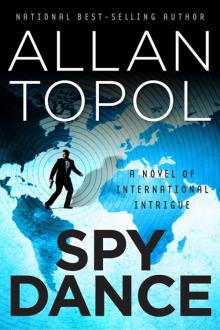 Spy Dance
Spy Dance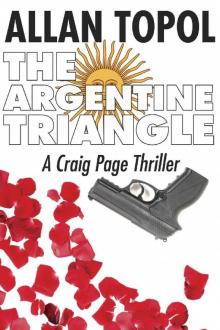 The Argentine Triangle: A Craig Page Thriller
The Argentine Triangle: A Craig Page Thriller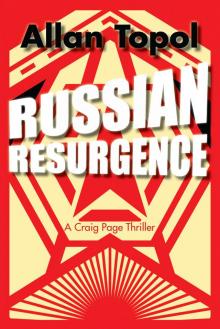 Russian Resurgence
Russian Resurgence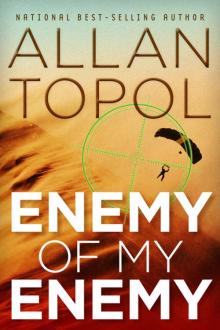 Enemy of My Enemy
Enemy of My Enemy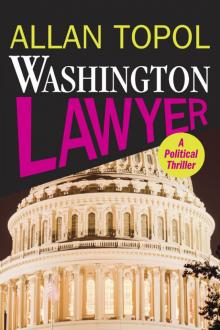 The Washington Lawyer
The Washington Lawyer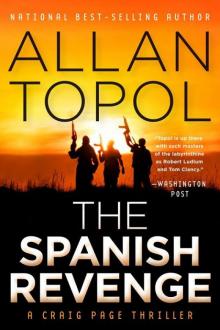 THE SPANISH REVENGE (Craig Page series)
THE SPANISH REVENGE (Craig Page series)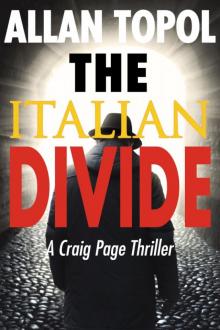 The Italian Divide
The Italian Divide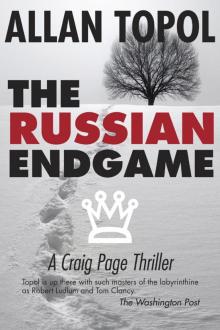 The Russian Endgame
The Russian Endgame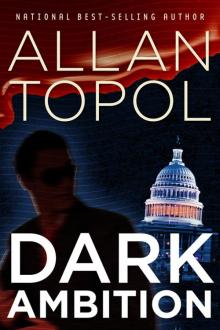 Dark Ambition
Dark Ambition